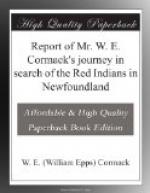* * * * *
I have now stated generally the result of my excursion, avoiding, for the present, entering into any detail. The materials collected on this, as well as on my excursion across the interior a few years ago, and on other occasions, put me in possession of a general knowledge of the natural condition and productions of Newfoundland; and, as a member of an institution formed to protect the aboriginal inhabitants of the country in which we live, and to prosecute inquiry into the moral character of man in his primitive state, I can, at this early stage of our institution, assert, trusting to nothing vague, that we already possess more information concerning these people than has been obtained during the two centuries and a-half in which Newfoundland has been in the possession of Europeans. But it is to be lamented that now, when we have taken up the cause of a barbarously treated people, so few should remain to reap the benefit of our plans for their civilization. The institution and its supporters will agree with me, that, after the unfortunate circumstances attending past encounters between the Europeans and the Red Indians, it is best now to employ Indians belonging to the other tribes to be the medium of beginning the intercourse we have in view; and indeed I have already chosen three of the most intelligent men from among the others met with in Newfoundland to follow up my search.
In conclusion, I congratulate the institution on the acquisition of several ingenious articles, the manufacture of the Boeothicks, some of which we had the good fortune to discover on our recent excursion;—models of their canoes, bows and arrows, spears of different kinds, &c. and also a complete dress worn by that people. Their mode of kindling fire is not only original, but as far as we at present know, is peculiar to the tribe. These articles, together with a short vocabulary of their language consisting of 200 to 300 words, which I have been enabled to collect, prove the Boeothicks to be a distinct tribe from any hitherto discovered in North America. One remarkable characteristic of their language, and in which it resembles those of Europe more than any other Indian languages do, with which we have had an opportunity of comparing it,—is its abounding in diphthongs. In my detailed report, I would propose to have plates of these articles, and also of the like articles used by other tribes of Indians, that a comparative idea may be formed of them; and, when the Indian female Shawnawdithit arrives in St John’s, I would recommend that a correct likeness of her be taken, and be preserved in the records of the institution. One of the specimens of mineralogy which we found in our excursion, was a block of what is called Labrador Felspar, nearly four one-half feet in length, by about three feet in breadth and thickness. This is the largest piece of that beautiful rock yet discovered any where. Our subsistence in the interior was entirely animal food, deer and beavers, which we shot.




